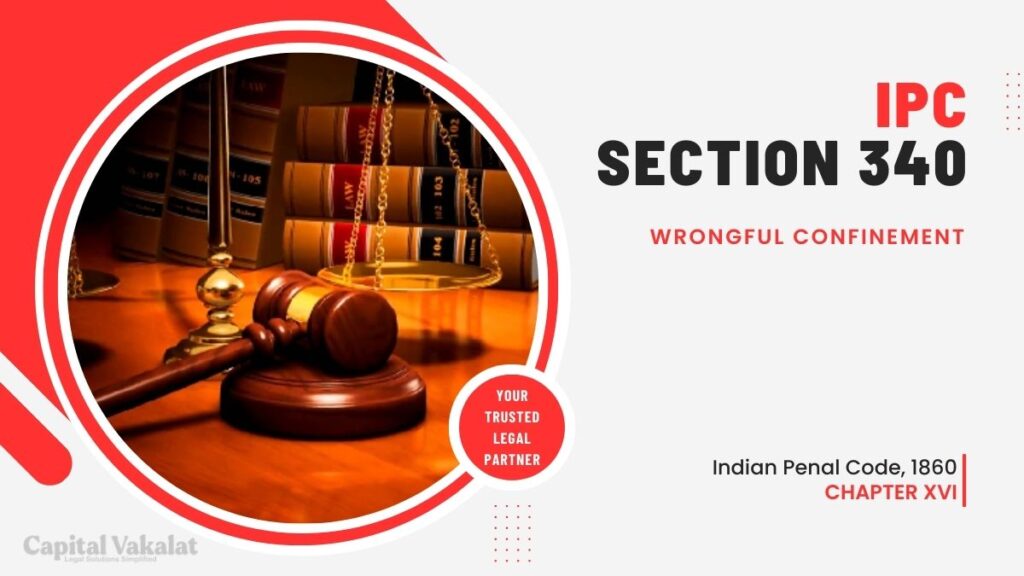Section 340 of the Indian Penal Code (IPC) deals with the offense of wrongful confinement. This legal provision holds great significance in safeguarding individual liberties and ensuring justice.

Understanding the intricacies of wrongful confinement is crucial for both legal professionals and the general public, as it sheds light on the rights and remedies available to those affected by such actions.
Definition of Wrongful Confinement
Wrongful confinement, as per Section 340 IPC, occurs when a person intentionally restricts the freedom of movement of another individual. This can involve physical restraint or creating circumstances that lead to confinement. The essential elements that constitute wrongful confinement include intention, knowledge, and the absence of lawful justification.
Distinction Between Wrongful Restraint and Wrongful Confinement
It is essential to distinguish between wrongful restraint and wrongful confinement, as both offenses pertain to restricting an individual’s freedom but differ in their scope and severity. Wrongful restraint involves preventing someone from moving in any direction, while wrongful confinement goes a step further by confining an individual to a specific place against their will.
Instances Leading to Wrongful Confinement
Instances of wrongful confinement can arise in various contexts, including domestic disputes, workplace conflicts, and civil or property-related disagreements. Understanding the common scenarios that lead to wrongful confinement helps individuals recognize potential risks and take preventive measures.
Legal Consequences of Wrongful Confinement
Engaging in wrongful confinement can lead to serious legal repercussions. Offenders may face criminal charges, including imprisonment, fines, or both. Additionally, victims of wrongful confinement can pursue civil litigation to seek compensation for the physical and psychological harm they have endured.
Remedies Available to the Victim
Victims of wrongful confinement have several legal remedies at their disposal. Filing a police complaint is the initial step to initiate criminal proceedings. Moreover, seeking a restraining order can provide immediate protection, while civil litigation enables victims to claim damages for the harm suffered.
Landmark Cases
Examining landmark cases related to wrongful confinement provides valuable insights into legal interpretations and precedents. These cases serve as examples of how the courts have addressed and adjudicated matters involving wrongful confinement, shaping the legal landscape.
Challenges in Prosecuting Wrongful Confinement
Prosecuting cases of wrongful confinement can be challenging due to various factors. Issues such as a lack of concrete evidence and difficulties in obtaining reliable witness testimony pose hurdles in achieving justice. Overcoming these challenges requires a comprehensive understanding of legal procedures and strategies.
Importance of Legal Assistance
Seeking legal assistance is paramount for individuals facing wrongful confinement or those advocating on behalf of victims. Legal professionals play a crucial role in navigating the complexities of the legal system, ensuring that the rights of the affected individuals are protected and upheld.
Conclusion
In conclusion, Section 340 IPC addresses the grave offense of wrongful confinement, emphasizing the importance of individual freedom and protection against unjust constraints. Understanding the legal nuances, distinguishing between related offenses, and being aware of available remedies are key elements in addressing and preventing wrongful confinement. As society progresses, a collective commitment to upholding these principles is vital for fostering a just and equitable environment.
Frequently Asked Questions
What evidence is crucial in proving wrongful confinement?
Evidence such as eyewitness accounts, video footage, and medical records documenting any injuries sustained during confinement can be crucial in proving wrongful confinement.
How long do legal proceedings related to wrongful confinement typically take?
The duration of legal proceedings varies, depending on factors such as the complexity of the case, the efficiency of the legal system, and the availability of evidence.
Can a restraining order prevent future instances of wrongful confinement?
Yes, obtaining a restraining order can serve as a preventive measure, restricting the offender from approaching or contacting the victim and minimizing the risk of future wrongful confinement.
Is wrongful confinement always a criminal offense, or can it have civil consequences as well?
Wrongful confinement is primarily a criminal offense, but it can also have civil consequences. Victims can pursue civil litigation to seek compensation for damages resulting from the wrongful act.